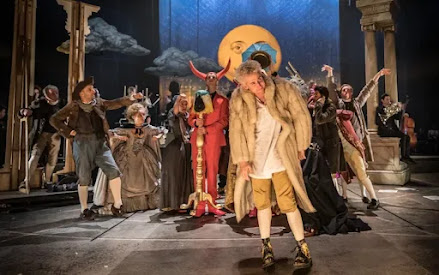Time has prevented me from writing anything about my mind being blown a few nights ago watching the 2017 National Theatre production of Peter Schaffer's masterpiece Amadeus. It was exciting to see the work revived - in a different production and edition - in the same theatre it premiered at in 1979. What a journey this play has taken over the decades since that first night.
Michael Longhurst's gives this Amadeus about as stunning a production as it will ever likely receive and once again I've witnessed something that left me emotionally spent and incredibly grateful I'm still alive. It made me remember that despite the wretchedness that surrounds us, the world still allows such magic as to make us forget it all long enough to remember how beautiful it can still be.
Visually, sumptuous, Longhurst gives his Amadeus a widescreen film perspective, with a large moveable (automatically receding and projecting) platform that accommodates the numerous scene changes and handsomely holds his enormous cast, which includes the 21 member Southbank Sinfonia - so that everything, every gesture feels magnified . . . larger than life
Since its premiere, Salieri has become one of the great villain roles of the last century and attracted a wide variety of top flight actors ready to rant, rave and poison his rival, Mozart, but Lucian Msamati may be the best of the many I've seen. His harrowing portrayal covers every possible aspect of Salieri's personality - the pettiness, the jealousy, the rage and self-loathing - to the point I was alternately sympathetic and disgusted by him. As it should be.

I initially had some issues with Adam Gillen's Mozart. Delivered in an exaggerated Cockney (as was Karla Crome's Constanza) that made increased his already annoying behaviour t o a level that was at times, difficult to take. He makes up for that to some degree with his physicality - literally throwing himself into every scene with an abandon that almost seems dangerous. All of that however, pays off handsomely in the final 30 or so minutes of the play. As Mozart's fortunes turn and his demise is imminent, Gillen's Wolfgang broke my heart - and I watched the final scenes in tears. It was beautifully painful and painfully beautiful.


The Southbank Sinfonia provide not just a consistent soundtrack in music of Mozart and others, including arrangements by Music Director, Simon Slater, but also are part of the action, several of them with lines. The operatic scenes are spectacularly delivered on floating proscenium arches with Mozart in tow several times, and an interesting arrangement of the Queen of the Night's aria that has Papagena sort of echoing the high notes. Sounds strange but it works. Brilliantly.
While I've loved this play for over forty years, right now I don't think I've ever loved it more.
Labels: Adam Gillen, Amadeus, Karla Crome, Lusican Msamati, Michael Longhurst, Mozart, National Theatre, Peter Schaffer, Salieri, Simon Slater, Southbank Sinfonia, theatre







